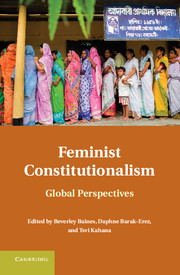Book contents
- Frontmatter
- Contents
- Foreword
- Contributors
- Introduction
- Part I Feminism as a Challenge to Constitutional Theory
- Part II Feminism and Judging
- Part III Feminism, Democracy, and Political Participation
- Part IV The Constitutionalism of Reproductive Rights
- Part V Women's Rights, Multiculturalism, and Diversity
- 17 Constitutional Rights of Women under Customary Law in Southern Africa
- 18 Minority Women
- 19 Watch GRACE Grow
- 20 Critical Multiculturalism
- 21 Democratic Theory, Feminist Theory, and Constitutionalism
- Part VI Women between Secularism and Religion
- Index
- References
21 - Democratic Theory, Feminist Theory, and Constitutionalism
The Challenge of Multiculturalism
Published online by Cambridge University Press: 05 June 2012
- Frontmatter
- Contents
- Foreword
- Contributors
- Introduction
- Part I Feminism as a Challenge to Constitutional Theory
- Part II Feminism and Judging
- Part III Feminism, Democracy, and Political Participation
- Part IV The Constitutionalism of Reproductive Rights
- Part V Women's Rights, Multiculturalism, and Diversity
- 17 Constitutional Rights of Women under Customary Law in Southern Africa
- 18 Minority Women
- 19 Watch GRACE Grow
- 20 Critical Multiculturalism
- 21 Democratic Theory, Feminist Theory, and Constitutionalism
- Part VI Women between Secularism and Religion
- Index
- References
Summary
This chapter addresses a particular subset of issues in the study of multiculturalism: issues concerning the treatment of disadvantaged groups within a minority culture. The problem is well recognized in the literature and is often referred to as an issue of “internal minorities” or as the “paradox of multicultural vulnerability.” The difficulty is that accommodations of the minority culture by the larger society sometimes result in serious harms to vulnerable groups within the minority culture. In the many controversies in liberal democracies over issues of accommodation, the vulnerable group that is hurt is often women. This chapter will argue that a central concern in such situations should be using the accommodation to encourage internal dialogue within the minority culture and to increase the capacity and opportunity for the vulnerable group to influence and challenge the dominant interpretation of their own culture. In other words, accommodation of the minority culture should be transformed from a threat to such vulnerable internal groups into a tool for strengthening their voices.
This issue in political theory has important implications for a range of issues in constitutional interpretation and design. One's view on the ways in which a legal order should protect minority cultural or religious groups and their practices – or, conversely, protect the vulnerable people within those groups against such practices – will deeply shape one's choice and/or interpretation of particular provisions in the constitution. For example, a strong position for protecting vulnerable internal minorities could lead to the adoption or interpretation of provisions addressing gender equality that require positive action on the part of government to eliminate gender discrimination in the private realms of family and community. On the other hand, a strong position for providing protection for cultural and religious minority groups could lead to the adoption or interpretation of provisions protecting cultural or religious rights that require accommodation of minority group practices. And, an attempt to harmonize disparate systems of cultural or religious norms and institutions with the state-based system through constitutional recognition for plural legal systems can facilitate either accommodation of the minority culture or intrusion by the larger society into the practices of the minority community. So, taking a particular position on the appropriate response of the state to the problem of internal minorities will have significant constitutional implications.
- Type
- Chapter
- Information
- Feminist ConstitutionalismGlobal Perspectives, pp. 393 - 410Publisher: Cambridge University PressPrint publication year: 2012
References
- 1
- Cited by



